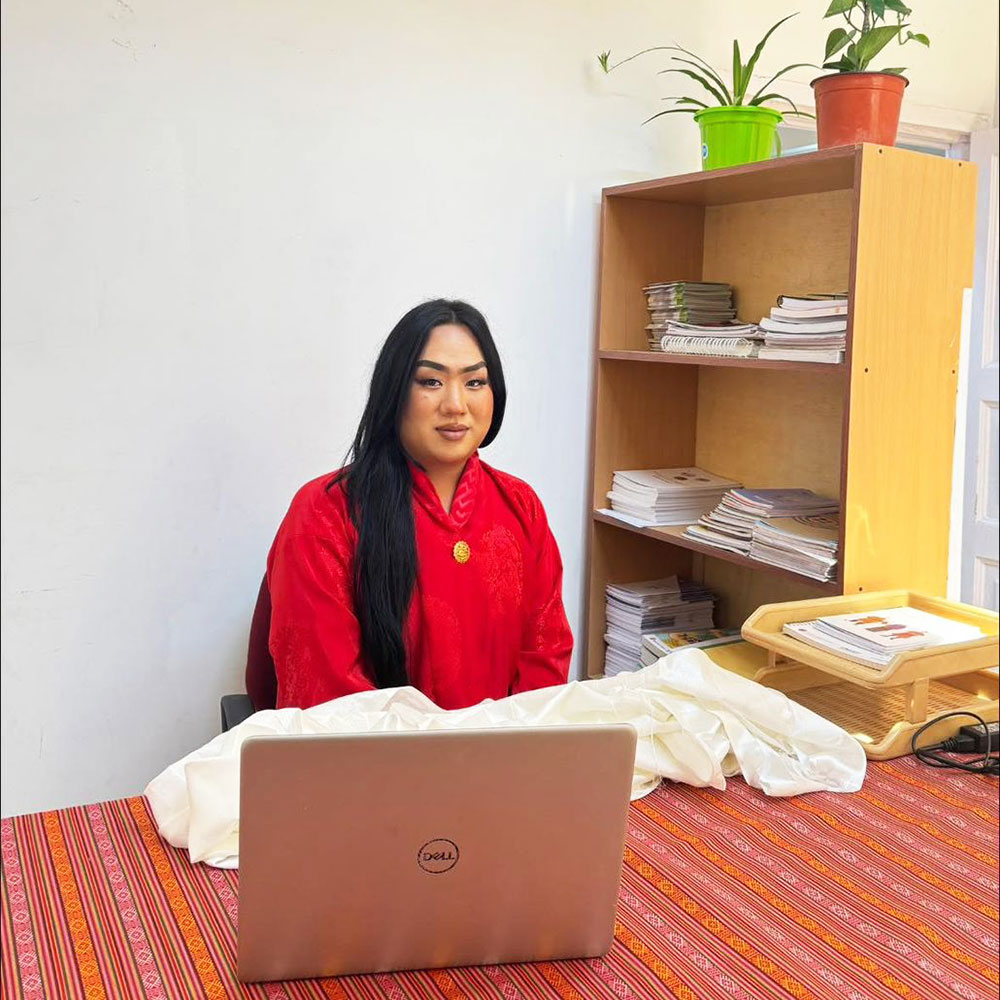Affectionately called Ana Katang (big sister) by her family and Tshokey by her friends, she is the face of trans women in Bhutan
Yangyel Lhaden
Her makeup flawless, her confidence unmistakable, Tshering Tshokey, 26, stands tall behind the newly opened Rainbow Help Desk—a new initiative by Respect, Educate, Nurture, and Empower Women (RENEW) that provides a safe space for survivors of gender-based violence (GBV) in the LGBTIQ+ community.
Having established herself as a successful makeup artist and entrepreneur with a thriving online business, Tshering Tshokey did not need this job—not for the money, at least.
So, why is she here?
Affectionately called Ana Katang (big sister) by her family and Tshokey by her friends, she is the face of trans women in Bhutan. She has worked as an outreach worker with Pride Bhutan and volunteered with various civil society groups, always striving to help her community.
“I am respected in the society because of the name I have built for myself, but I know I cannot succeed alone. We all need to grow together,” she says. “I am here to empower my community, especially trans women, to find respectable jobs and the support they deserve along with helping them address GBV through services from the Rainbow desk.”
Tshering Tshokey believes that identity does not define respect or success. “It is about proving your worth. If you are capable, society will accept you—regardless of who you love or how you express yourself because if you are not capable and even if you are straight the society won’t accept you.”
While life has not been easy, she says, “I have worked hard to prove that my identity is a strength, not a limitation. I have broken barriers, not by force, but with grace.”
Little wonder, she is one of the few empowered, successful, independent transwomen in the country. Yet, it has not been easy for her either.
During her school days, the concept of LGBTIQ+ was still fairly new, and due to a lack of awareness and acceptance, she was relentlessly bullied. A traumatic memory that refuses to go is one where she locked in a toilet and her male peers poured buckets of water over her.
This horrendous incident pained her mother so much that she pulled Tshering Tshokey out of school, mid-way grade 11.
“This is why many in our community drop-out of school. Discrimination pushes many of us into under-appreciated sectors for employment. But what choice do we have?” she says.
A few studies done on LGBTIQ+ communities in Bhutan reveal significant barriers faced by transgender and sexual minorities in the country, including stigma, discrimination, and inadequate gender-sensitive healthcare.
While LGBTIQ+ advocacy groups, such as Queer Voices of Bhutan and Pride Bhutan, raise awareness and create safe spaces for the community members, transgender women face employment discrimination.
Discrimination and limited opportunities faced by the LGBTIQ+ community impose a substantial economic cost, preventing individuals from reaching their full potential and ultimately impacting the economy. For instance, the World Bank Group’s Economic Cost of Exclusion report highlights how discrimination against LGBTI individuals restricts their opportunities in key areas such as education, employment, and healthcare
Studies in North Macedonia and Serbia estimate that exclusion based on Sexual Orientation, Gender Identity and Expression, and Sex Characteristics (SOGIESC) results in annual economic losses of 0.5 percent of Gross Domestic Product (GDP) for both countries. Additionally, the research shows fiscal losses of 0.1 percent of Serbia’s 2021 GDP and 0.13 percent of North Macedonia’s GDP.
Tshering Tshokey has always been accepted by her family. She did not have to come out because they always knew. And she never had to fight to be accepted. Gradually, she began wearing makeup, growing her hair long, and dressing in women’s clothing. “My family was worried about what society would think, but they never excluded me,” she says.
However, she felt pressured to fit into the stereotypical idea of a trans woman. She was 14 when she first saw trans women “coming out” in Bhutan, often in dance clubs, wearing loud makeup and extravagant fashion. When she transitioned, that’s what she tried to follow but struggled and eventually failed.
While volunteering for the LGBTIQ+ network under Lhaksam, she got the opportunity to travel to Cambodia, where she met successful trans women—entrepreneurs and makeup artists. This eye-opening experience entirely changed her view.
“I decided to transition and prove that trans women could succeed without fitting into stereotypes,” she says.
She began her transition by 2018. Two years later, she was freelancing as a makeup artist, with her own rented apartment—financially independent, and giving back to her family.
Her love for makeup began in childhood, sparked by comparisons to her six siblings that left her feeling overlooked. Self-taught through YouTube, her skills were eventually recognised by popular makeup artist Zozomi, who hired her as an assistant. This opportunity set her on a new path, leading her to become an independent makeup artist while also working as an outreach worker at Pride Bhutan.
Tshering Tshokey’s life was on track until last year when she lost two important people, including her mother. She was overwhelmed by grief, yet found solace in her family, faith, and deep reflection on her purpose. Determined to carry on, she resolved to continue supporting her community.
From Tshering Dhendup (old name) to Tshering Tshokey, her journey has been extraordinary. “Tshering”, birth name given by her mother, is a cherished reminder of her roots while”Tsho” honours a dear friend who stood by her during her transition and “Key” represents someone she admires deeply. Together, these elements of her name serve as a constant reminder of the love and support that continue to guide her journey.
Yet she is also fully aware that for many like her, survival is a daily struggle. In a society where being different often means being invisible, she refuses to disappear. And she is here to stay—shining brightly, breaking barriers one step at a time.


